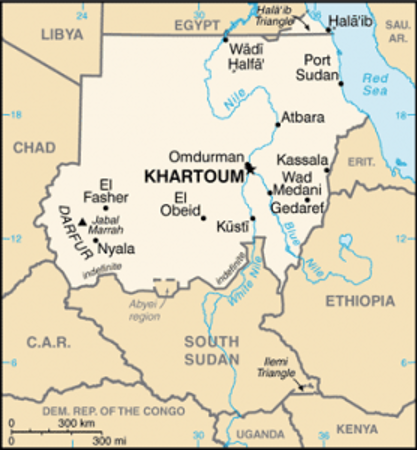Note this excerpt from a recent Reuters story:
"U.S. Fears Serious Famine in Troubled Sudan Region"
By Andrew Quinn WASHINGTON
Tue Jan 24, 2012 3:52 pm EST
“The United States fears a large-scale famine in Sudan’s restive border states of Southern Kordofan and Blue Nile and is boosting pressure in Khartoum to accept aid or face a unilateral assistance operation, a senior U.S. official said on Tuesday…”
For the rest of the article: http://www.reuters.com/article/2012/01/24/us-sudan-usa-idUSTRE80N1WI20120124
In the Horn of Africa, Sudan is considered a failing state. The United States closed its embassy in Khartoum in 1996. This country with a significant Muslim and Christian population, has had internal strife, interclan fighting, safe-havens for terrorist groups and terrorist training camps; participated in genocide – all of which have become the norm ever since. Our absence there had provided a paucity of reliable in-country intelligence information.
 Sudan
Sudan
A former diplomat who was the Sudan country-watcher in the 1990′s, told me that information gathering was difficult under the best of circumstances, but would have been more accurate had the United States kept an active presence there.
Sudan’s north and south regions are becoming a humanitarian crisis, but we need to be equally concerned about the western Darfur region, which has been a humanitarian disaster with a rootless society of more than five million people, even though the United States has infused more than $4 billion in assistance since 2004.
Sudan is one of the richest oil-producing countries in Africa, with over six billion barrels of oil reserves. The income from the rich Abyei region is more than $2 billion per year, equating to almost $50 a person, based on Sudan’s current population. Revenue sharing would go a long way to curb disaster relief programs.
In Sudan peace negotiations have been persistent, but progress can be measured only by optimism, rather than substantive lasting solutions, even after the 2005 Peace Agreement.
The partitioning of Sudan was the only viable solution to resolve the ethnic differences between the Muslim north and Christian south, with each of these societies being given their own homeland as sovereign states, with defined borders. Since the oil resources are located in the Christian south, this economic obstacle will need to be overcome with a fair revenue sharing arrangement between both states. The Darfur region needs to be addressed as ethnically or culturally the tribes there do not fit into either the north or the south. As for the killing fields of Darfur, if solutions are not found and implemented the genocide there will continue. I believe the mayhem that ensued in the semiautonomous south and Darfur regions might have been avoided had the United States stayed actively engaged with a permanent diplomatic presence in 1996.
The U.S. Embassy in Khartoum was reopened in 2003, headed by a charge d’ affaires, but not an accredited ambassador. The United States has had a number of special envoys in Sudan since, but the effect has been nominal, since they were there for limited periods of time. It is erratic diplomacy at best. To successfully engage Sudan we need a full time accredited diplomat there.
In January 2011, a self-determination referendum vote was held in southern Sudan as provided for in the 2005 peace accord between the Khartoum government and the Sudan People’s Liberation Army/Movement. On February 7, the results were announced with the majority of the people voting in favor of independence. South Sudan officially became an independent state on July 9, 2011. However the borders were never totally defined, so a further referendum vote on the oil rich Abyei region still needs to be held, once its borders are established and residency issues resolved.
Meanwhile fighting and chaos continues to exist between the northern and southern armies and rebel militia forces. To add to this instability there is tribal fighting and rustling of large herds of cattle, the main stay for these tribes located in the areas adjacent to the disputed Abyei oil region. This instability has brought about a new humanitarian crisis without having resolved the one in Darfur.
The partitioning of the north and south territories was brokered with U.S. input, in an attempt to resolve the long standing disputes between these ethnically different regions. But the process fell short of establishing a lasting peace, with properly defined borders, and an oil sharing agreement. The theory was like the “camel-in-the-tent” story. Once you get the head of the camel in the tent, the rest of the body will follow. Well that did not work. So let’s go to the next theory — a diplomatic approach, starting with a fully accredited ambassador to engage the parties of interest, on a consistent basis, to reach a lasting peaceful solution.